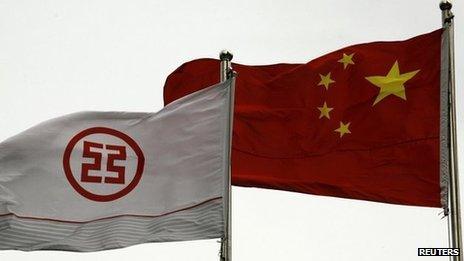The risks for the City of becoming China's offshore centre
- Published
- comments

Good for Chinese banks, good for China - but what about the UK?
The chancellor has today announced an agreement with China's vice-premier, Ma Kai, to help fulfil his aim of making the City the main offshore centre for Chinese financial business.
Under an £8bn pilot scheme, London-based investors will be able to apply for a licence to use the Chinese currency, the RMB, to invest directly in Chinese shares and bonds, rather than having to direct their investments via Hong Kong.
This should reduce the costs of investing in China via London - although the sums involved in this initial pilot are small.
George Osborne has also brokered talks between Chinese banks and the UK banks regulator, the Prudential Regulation Authority, to allow them to establish branches for wholesale activities in London.
This would allow China's huge banks to conduct business in London with companies and financial institutions, but not retail customers.
It will be fascinating to see how fast the UK regulator negotiates the award of these branch licences, and what conditions it attaches to them.
There is a lively debate among regulators about whether it is healthy or dangerous for the City to be thronged with branches of huge international banks, as opposed to subsidiaries of international banks.
Where a bank has a subsidiary in London, it is subject to much tighter regulation by the PRA than a branch would be.
But in the event that a foreign bank runs into financial difficulties, the cost of rescuing a subsidiary would fall on British taxpayers and the UK deposit protection scheme, whereas the cost of rescuing a branch would fall on the taxpayers of the bank's country of origin.
This debate about whether branches or subsidiaries are better for Britain has become livelier following two recent events:
the so-called London Whale scandal at a London-based branch of JPMorgan, which was subject to relatively light touch regulation here;
and the collapse of Cyprus's Laiki branch, which operated as a branch in Britain and wasn't therefore covered by the deposit protection scheme.
Banks themselves much prefer to branch into new territories, rather than establish subsidiaries, because branching is much cheaper and more financially efficient.
Since the crash, British regulators have been trying to encourage banks to convert their British branches into subsidiaries.
However, Andrew Bailey, the PRA's chief executive, recently signalled in a briefing to bankers that he was coming round to the idea that branches were not such a bad idea, so long as the PRA could have reasonable access to them and oversight of them.
In the case of China's giant banks, the chancellor seems to be taking the view that he would prefer the branch arrangement that would see the Chinese government as the ultimate guarantor of the liabilities of their future London operations - although this would have the potential for becoming messy if any of those banks behaved recklessly here.
UPDATE 08:15 BST
Here are a few other points on the chancellor's deal with China on making the City a bigger centre for trading the RMB, the Chinese currency.
First, he is hopeful that the £8bn capacity for direct investment in Chinese stocks and bonds is a quota that will be more or less automatically renewed, when it is used up.
Second, the initial licence to invest directly in this way is likely to go to a bank, rather than a fund management group. I hear HSBC is in the frame to get the first licence.
Third, London is the first place outside Greater China to be granted a quota for direct investment of this sort.
Fourth, the Treasury is confident that the PRA will grant branch licences to China's biggest state-owned banks.